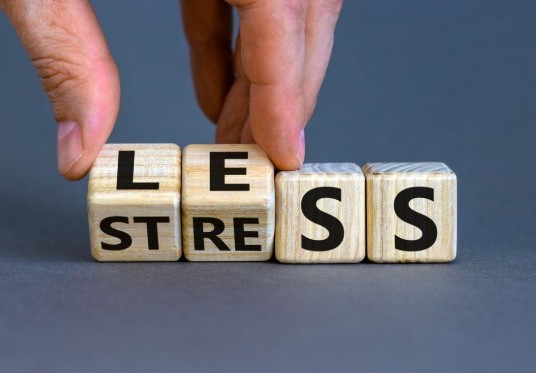April is National Stress Awareness Month
A time to pause and reflect on the causes and effects of stress in our lives. And to promote effective stress management techniques to enhance mental health and wellbeing.
This years theme is #LeadWithLove—a powerful call to action rooted in the principles of Unconditional Positive Regard. This theme encourages us to approach ourselves and others with kindness, compassion, and acceptance, no matter the challenges we face.
In today’s world, where stress often thrives in the midst of conflict, tension, and division, we believe that love is the universal force capable of shifting the narrative. By choosing love as our starting point, we embrace empathy, prioritize understanding, and create positive change in every interaction.
Whether it’s extending a gesture of kindness to someone nearby, offering support to global communities, or simply practicing self-love, even the smallest acts of love can spark powerful waves of positivity that ripple outward.
But What is Stress?
Firstly, let’s debunk one myth: stress is not necessarily a ‘bad’ thing. Without our ability to feel stress, humankind wouldn’t have survived. Our cavemen ancestors, for example, used the onset of stress to alert them to a potential danger, such as a saber-toothed tiger.
Stress is primarily a physical response. When stressed, the body thinks it is under attack and switches to ‘fight or flight’ mode, releasing a complex mix of hormones and chemicals such as adrenaline, cortisol and norepinephrine to prepare the body for physical action. This causes a number of reactions, from blood being diverted to muscles to shutting down unnecessary bodily functions such as digestion.
Through the release of hormones such as adrenaline, cortisol and norepinephrine, the caveman gained a rush of energy, which prepared him to either fight the tiger or run away. That heart pounding, fast breathing sensation is the adrenaline; as well as a boost of energy, it enables us to focus our attention so we can quickly respond to the situation.
In the modern world, the ‘fight or flight’ mode can still help us survive dangerous situations, such as reacting swiftly to a person running in front of our car by slamming on the brakes.
The challenge is when our body goes into a state of stress in inappropriate situations. When blood flow is going only to the most important muscles needed to fight or flee, brain function is minimized. This can lead to an inability to ‘think straight’; a state that is a great hindrance in both our work and home lives. If we are kept in a state of stress for long periods, it can be detrimental to our health. The results of having elevated cortisol levels can be an increase in sugar and blood pressure levels.
When Stress Becomes a Bad Thing
A useful analogy to explain stress is that of a bridge. When a bridge is carrying too much weight, it will eventually collapse. However, before this happens it is possible to see the warning signs, such as bowing, buckling or creaking. The same principle can be applied to human beings. It is usually possible to spot early warning signs of excessive pressure that could lead to breakdown.
Some signs of a bowing and buckling bridge to look out for:
Being more accident prone
Forgetting things
Showing a negative change in mood or fluctuations in mood
Avoiding certain situations or people
Using more negative or cynical language
Becoming withdrawn
Showing a prolonged loss of sense of humor
Becoming increasingly irritable or short-tempered
Having more arguments and disputes
A tendency to suffer from headaches, nausea, aches and pains, tiredness and poor sleeping patterns
Indecisiveness and poor judgement
A problem with drinking or drug taking
Coping With Stress
Get enough sleep
Sleep is essential for the body to function properly. If you skimp on sleep you probably won’t remember how it feels to wake up fully rested. A routine can help you get to sleep. Think of how children are put to bed – adults can adopt similarly helpful sleep-enhancing routines. For example: Have a relaxing bath Avoid anything stimulating, such as an exciting TV programs or games. When you are lying in bed, inhale for 4 seconds, hold your breath for 7 seconds, and exhale for 8 seconds. Whether you’re thinking of tasks, worries or silly thoughts, write them down. This will help you set them aside and you can rest assured that you’ll deal with them in the morning.
Listen to music
Music can be used in many situations to help reduce stress and create a calming atmosphere: Use classical music to concentrate as it is peaceful, harmonious and doesn’t have lyrics. Keep the volume relatively low so it doesn’t distract you. Music can also be a reminder to take breaks. Make a playlist that lasts for approximately 1 hour, once the music stops, take a moment away from what you’re doing. Making a playlist also stops you from searching for songs, helping you to focus on the task without distraction. When using music to help you relax before sleep, choose soothing music with monotonous repetition, such as sounds of nature or ambient music
Manage your time optimally
Stress often results from difficulty in coping with day-to-day problems and conflicting responsibilities. A useful strategy for dealing with a sense of being overwhelmed by all the things that need attention is prioritizing and diarizing: Make a list of all the things that you need to do; list them in order of genuine importance; note what you need to do yourself and what can be delegated to others; note what needs to be done immediately, in the next week or next month, etc. Create time buffers to deal with unexpected emergencies – this is a great way to prepare and avoid excess stress. Arrange your workload to match your energy levels, e.g. if you know that you have an energy boost in the mornings, use that time for high energy or creative task.
Work off stress with physical activity
Pressure or anger releases adrenaline in the body. Exercise helps to reduce it, and produces ‘good mood’ substances in the brain. This doesn’t mean we recommend running a marathon; just going for a brisk walk around the block when you feel tense can help.
Breathe
Taking a few deep breaths allows more oxygen to reach the brain, helping you become calm and restore concentration and focus: Take a nice slow deep breath in through the nose and fill the belly up with air. Hold at the top of the breath for 5 seconds and then slowly exhale through the mouth, pulling the navel to the spine. Repeat 5 times.
Hobbies
Activities outside of work and home can be a great way to break up the week and alleviate stress. If you don’t know where to start then think about what you enjoyed as a child, e.g. reading, playing football, painting, etc.
Talk to someone
We’ve all heard of the saying “a problem shared is a problem halved” and, like most clichés, it’s founded on a grain of truth. If you are troubled by something, don’t suppress it, reach out to us at Peaceful Summit Counseling.
There’s a path that best for you. We can help you find it
Adapted from articles from The Stress Management Society. Stress.org.uk



